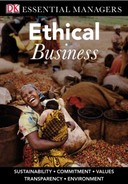Investing Ethically
In the 21st century, ever more people are endorsing ethical organizations with their money. In the US alone, it is estimated that three-quarters of investors take ethical issues and an organization’s conduct into consideration when deciding where to commit their funds.
Getting in tune
Ethical investing[] is a strategy that is being embraced by individuals, nonprofit organizations, governments, and corporations. As a manager, you have a responsibility both to ensure that your organization is attractive to potential investors, and that your own funds are managed in a way that does not have negative impacts on society.
Ethical investment was thrust on to the world stage in the 1970s and 1980s, when individuals and corporations refused to invest in South African companies because of the human rights abuses of apartheid. Today, many investors refuse to put their money into funds associated with unethical actions, no matter how lucrative the prospects, and conversely, will seek out investment opportunities with clear social benefit.
Ethical investing—an investment strategy that attempts to balance financial return on investment and a positive impact for all stakeholders.Seeing new opportunities
The idea of ethical investing varies by country, and depends on the cultural perceptions of companies and their practices. For example, Europeans are far more wary of genetically engineered crops than Americans, so may be less likely to invest in GM technologies. However, some areas, such as renewable energy, are almost universally viewed as an ethical—and in the long term, essential—alternative to the consumption of fossil fuels. Recent statistics bear out that ethical investment is more than a sideline to making money: ethical funds have performed well over the years, and the World Trade Organization is set to tighten regulations on companies that exploit people, animals, or the environment, making ethical investment a better bet for reliable investment.
Creative investment
Ethical investment can be very creative: in the UK, venture capital company Bridges Ventures has provided capital to ventures such as The Gym, a fitness chain based in deprived areas, which offers low charges to its members; and the Hoxton Hotel, a successful operation in a run-down area of East London. It has funded Whelan Refining Limited, a company that recycles waste oil to produce base oil—the base for all industrial and automotive lubricants—and programs that provide low-cost housing for key workers. Bridges Ventures publishes an ethical charter that encompasses its approach to employees, suppliers and contractors, investors, the community, and the wider environment.
Choosing your investment
Investments are made on your behalf every day, and you may not be aware of where your money is going. Select financial services providers, such as banks pension, and insurance companies that are transparent about the criteria they use to choose ethical investment. These are likely to be:
Negative criteria: rejecting investment in firms involved in tobacco, the arms trade, and environmental damage, or those recently censured for misconduct.
Positive criteria: seeking out companies that have a measurable positive impact on society or the environment, such as sustainable energy or recycling.
Engagement: using your power as a shareholder to change for the better the ways in which the company engages with people and the environment.
TIP
Remember that ethical investors are still investors: they are looking for good financial returns and security as well as the promotion of socially responsible strategies.
